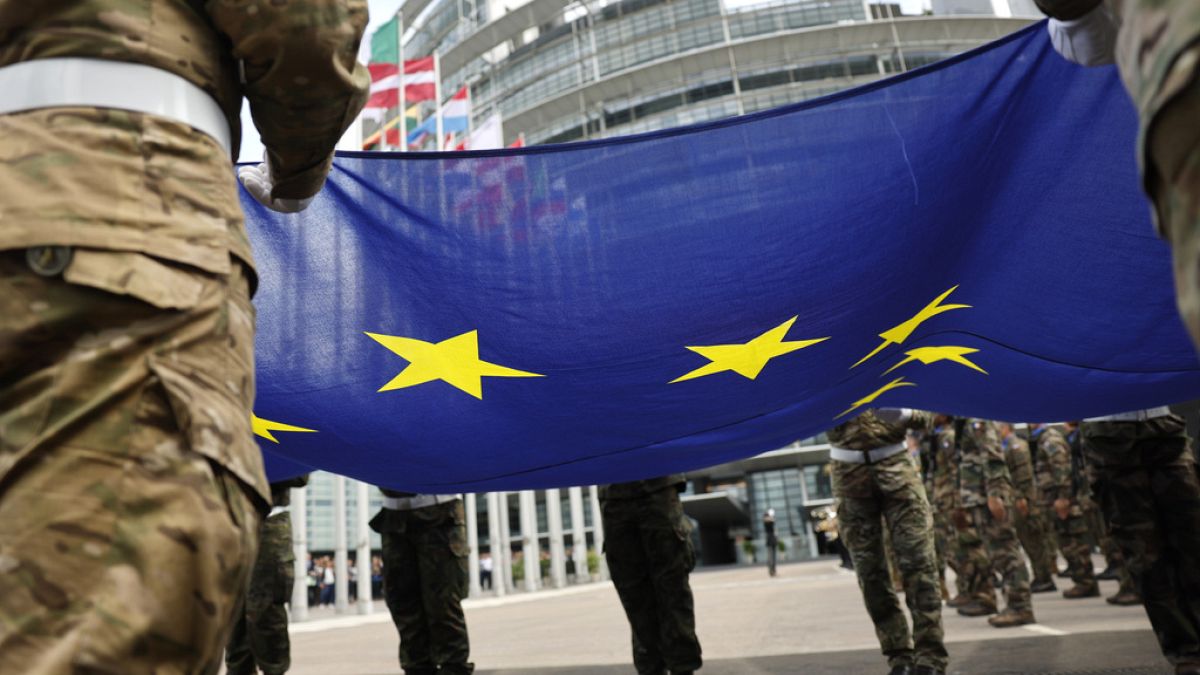Why are European defence stocks skyrocketing after Trump’s victory?

Trump’s 2024 win and Republican control of Congress have spurred a surge in European defence stocks, as concerns over NATO funding and potential cuts in US military aid drive expectations that Europe will boost its defence spending.
European defence stocks are soaring in the wake of Donald Trump’s 2024 US election victory and the Republican party’s near-total control of Congress.
Investors seem to have read between the lines of Trump’s past rhetoric: more NATO burden-sharing, less US military aid, and a potential for European defence firms to capitalise on bolstered security budgets in Europe.
Italian defence contractor Leonardo SpA’s stock has jumped 17% since Trump’s election, with German arms manufacturer Rheinmetall AG climbing an impressive 22%, and Hensoldt AG, a German defence sensor specialist, rallying 18%.
For these companies, a potential European defence funding surge spells opportunity. In sharp contrast, European carmakers have seen their stock prices tumble as Trump’s protectionist stance on trade has re-emerged, raising fears of new tariffs.
‘America first’ and NATO’s ‘wallet first’: Time for Europe to pay up?
During his previous term, Trump made no secret of his belief that the US bore an unfair burden for NATO’s defence costs and even flirted with pulling the US out of the alliance.
Some believe this wasn’t just election bluster. Analysts now expect Europe will have to dig deeper into its coffers.
“The European Union does not speak collectively with one voice and member states are very far from having the same objectives on defence,” Brussel-based economic think tank Bruegel wrote in a report.
On Monday, German Foreign Minister Annalena Baerbock stated, “We must think big about investments in European security and make them big,” advocating a shift away from NATO’s 2% GDP defence target toward a more substantial commitment.
In September, German Defence Minister Boris Pistorius proposed increasing defence spending to between 3% and 3.5% of Germany’s gross domestic product (GDP). The sentiment appears to have backing, with a new Koerber-Stiftung Institute poll revealing that 73% of Germans believe Germany should increase spending on European security.
“The election result in the USA and the breakdown of the traffic light coalition are a real stress test for Europe,” said Nora Müller, Head of International Politics at the Körber Foundation. “The fact that a majority of the German population is of the opinion that Germany should invest more money in European security should be understood as a vote to consistently implement the ‘turning point,’ regardless of who forms the federal government in the future.”
Statistics from NATO show that in 2023, only nine European countries—Denmark, Hungary, Slovakia, Finland, Latvia, Lithuania, Estonia, Greece, and Poland—met the 2% GDP defence spending target.
In contrast, the three largest European economies—Germany, France, and Italy—fell short of this benchmark, while the U.S. allocated 3.2% of its GDP to defence, surpassed only by Poland.
Analysts see defence budgets rising for Europe
Goldman Sachs analysts have weighed in, suggesting that Trump’s re-election could translate to renewed defence spending demands on Europe.
According to the investment bank’s analysis, meeting NATO’s 2% GDP target and offsetting any potential decrease in U.S. military aid to Ukraine could cost the European Union an additional 0.5% of its GDP annually.
In fact, the US currently provides approximately €40 billion per year (around 0.25% of EU GDP) in military support to Ukraine—a commitment Trump has indicated he would roll back. Any reduction in US support would likely require European countries to increase their spending to fill the void, adding yet another fiscal responsibility onto European shoulders.
Defence contractors across Europe are already positioning themselves for potential upticks in orders, with giants like Rheinmetall and Leonardo preparing for increased demand.
Armin Papperger, CEO of Rheinmetall, noted that Trump’s stance “will prep the Europeans to be more independent,” with pressure mounting from the US for European NATO allies to increase their defence budgets well beyond the established 2% threshold. European Defence CEOs Eye Opportunity Amid New Financial Pressures European defence leaders appear ready to meet the challenge—and reap the potential rewards.
Roberto Cingolani, CEO of Leonardo, recently told the Financial Times that Europe must be prepared to act independently. “As Europeans we are fully aware, without Trump having to tell us, that we need to step up contributions [to NATO],” he said. “After all, it is not in our interest to be the minority partners.”
Yet the reality is clear: Europeans are being called on to shoulder more of the continent’s security burden, a shift that could alter defence funding priorities and shape European military alliances for the foreseeable future.
As Trump’s return to power shakes up transatlantic relations, European nations and defence firms alike are bracing for a new era in defence spending—one where Europe pays, but also stands on its own two feet.
Related
A New Book Argues That What Happens in Europe Doesn’t…
Remaking the World: European Distinctiveness and the Transformation of Politics, Culture, and the Economy by Jerrold Seigel “No issue in world
Poland plans military training for every adult male amid growing…
Poland’s prime minister, Donald Tusk, has said his government is working on a plan to prepare large-scale military training for every adult male in response t
2025 European Athletics Indoor Championships: Ditaji Kambundji secures women’s 60m…
Switzerland’s Ditaji Kambundji walked away from the 2025 European Athletics Indoor Championships in Apeldoorn on 7 March with much more than her first Europea
Takeaways from the EU’s landmark security summit after Trump said…
BRUSSELS (AP) — European Union leaders are trumpeting their endorsement of a plan to free up hundreds of billions of








